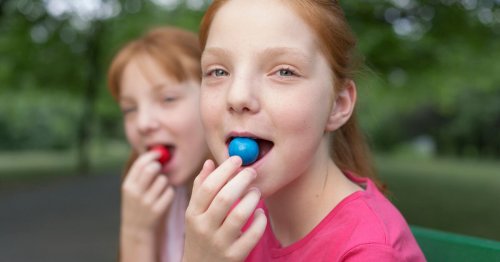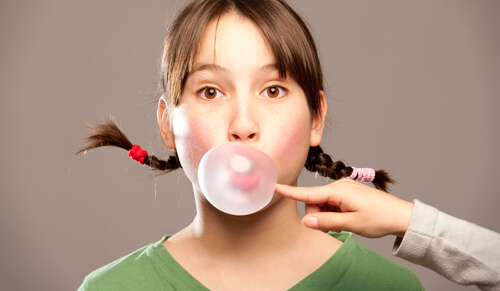What to Do if Your Children Swallow Gum?

No matter how hard you try to stop your children from chewing gum, they’ll probably find a way to do so. Maybe someone gives it to them as a birthday present, a Halloween treat, or a gift from their grandparents. So, what can you do if your children swallow gum?

As soon as you notice your children chewing gum, teach them how to properly do it. Make them understand that they’re supposed to enjoy its flavor and chew it until it’s time to throw it away.
You’ve probably heard stories about what happens to gum in our stomachs. Most of the time, these stories are just myths. Some myths state that if you swallow gum, it’ll get stuck in your stomach for up to seven years.
What can you do if your children swallow gum? Well, first, try to stay calm and don’t pay attention to these myths. Knowing what’s right and really necessary will help prepare you to deal with this situation properly.

How long does gum stay in our body?
Gum is made of elastomers, plasticizers, and resins, sweeteners, oils, and flavorings. This makes it resilient against stomach acids and it can’t dissolve. Nonetheless, our bodies can oust them just fine.
Gum will go through our stomachs, like any other food, and it’ll be nearly impossible to get it stuck inside our stomachs. It won’t stay inside your child’s body forever; it’ll be excreted out.
Is it dangerous if my children swallow gum?
It can be risky if they swallow more than five units at a time, which can make it stuck in the esophagus and suffocate them or obstruct their intestines. This can be serious enough and should be treated with surgery.
If you notice your children stop going to the bathroom, as often as they did, it could mean an intestinal obstruction. If they also feel nauseous or vomit a yellow or green substance, it’s time to go to the ER.
The consequences of chewing gum
- Chewing gum fills you with air, which can cause abdominal cramps and swell for constantly swallowing saliva. Sending fake signals to the stomach will activate its acids, and it’ll think it needs to digest food. This will cause more gas and other gastrointestinal issues.
- Sometimes, chewing gum is recommended as a relaxation method for the mouth, but doing it for a long time can cause the opposite effect.
- Some gums are made with chemicals like sorbitol, a known laxative that could be toxic and cause strong stomach cramps and diarrhea.
- On the other hand, some gums have high levels of natural sugar. The excess of sugar in the teeth can cause cavities.

For children under five years old, it’s best to keep them from chewing gum, because they’re not old enough to know it shouldn’t be swallowed.
On the other hand, you should instruct older children to throw the gum out after it loses its flavor because gum doesn’t add nutritional value to our bodies. Chewing gum can turn into a negative habit, because it may damage our health and our environment.
No matter how hard you try to stop your children from chewing gum, they’ll probably find a way to do so. Maybe someone gives it to them as a birthday present, a Halloween treat, or a gift from their grandparents. So, what can you do if your children swallow gum?

As soon as you notice your children chewing gum, teach them how to properly do it. Make them understand that they’re supposed to enjoy its flavor and chew it until it’s time to throw it away.
You’ve probably heard stories about what happens to gum in our stomachs. Most of the time, these stories are just myths. Some myths state that if you swallow gum, it’ll get stuck in your stomach for up to seven years.
What can you do if your children swallow gum? Well, first, try to stay calm and don’t pay attention to these myths. Knowing what’s right and really necessary will help prepare you to deal with this situation properly.

How long does gum stay in our body?
Gum is made of elastomers, plasticizers, and resins, sweeteners, oils, and flavorings. This makes it resilient against stomach acids and it can’t dissolve. Nonetheless, our bodies can oust them just fine.
Gum will go through our stomachs, like any other food, and it’ll be nearly impossible to get it stuck inside our stomachs. It won’t stay inside your child’s body forever; it’ll be excreted out.
Is it dangerous if my children swallow gum?
It can be risky if they swallow more than five units at a time, which can make it stuck in the esophagus and suffocate them or obstruct their intestines. This can be serious enough and should be treated with surgery.
If you notice your children stop going to the bathroom, as often as they did, it could mean an intestinal obstruction. If they also feel nauseous or vomit a yellow or green substance, it’s time to go to the ER.
The consequences of chewing gum
- Chewing gum fills you with air, which can cause abdominal cramps and swell for constantly swallowing saliva. Sending fake signals to the stomach will activate its acids, and it’ll think it needs to digest food. This will cause more gas and other gastrointestinal issues.
- Sometimes, chewing gum is recommended as a relaxation method for the mouth, but doing it for a long time can cause the opposite effect.
- Some gums are made with chemicals like sorbitol, a known laxative that could be toxic and cause strong stomach cramps and diarrhea.
- On the other hand, some gums have high levels of natural sugar. The excess of sugar in the teeth can cause cavities.

For children under five years old, it’s best to keep them from chewing gum, because they’re not old enough to know it shouldn’t be swallowed.
On the other hand, you should instruct older children to throw the gum out after it loses its flavor because gum doesn’t add nutritional value to our bodies. Chewing gum can turn into a negative habit, because it may damage our health and our environment.
All cited sources were thoroughly reviewed by our team to ensure their quality, reliability, currency, and validity. The bibliography of this article was considered reliable and of academic or scientific accuracy.
- ¿Qué sucede con la goma de mascar que tragamos? (s. f.). Recuperado 31 de enero de 2022, de Kidshealth.org website: https://kidshealth.org/es/kids/swallowed-gum.html
- YouTube. (2018). ¿Tragaste un chicle? ¡No hay problema! Expertos explican por qué no te hará daño. [online] Disponible en: https://www.youtube.com/watch?v=Dfm1iOICwFs&t=8s [Accessed 13 Nov. 2018].
This text is provided for informational purposes only and does not replace consultation with a professional. If in doubt, consult your specialist.








